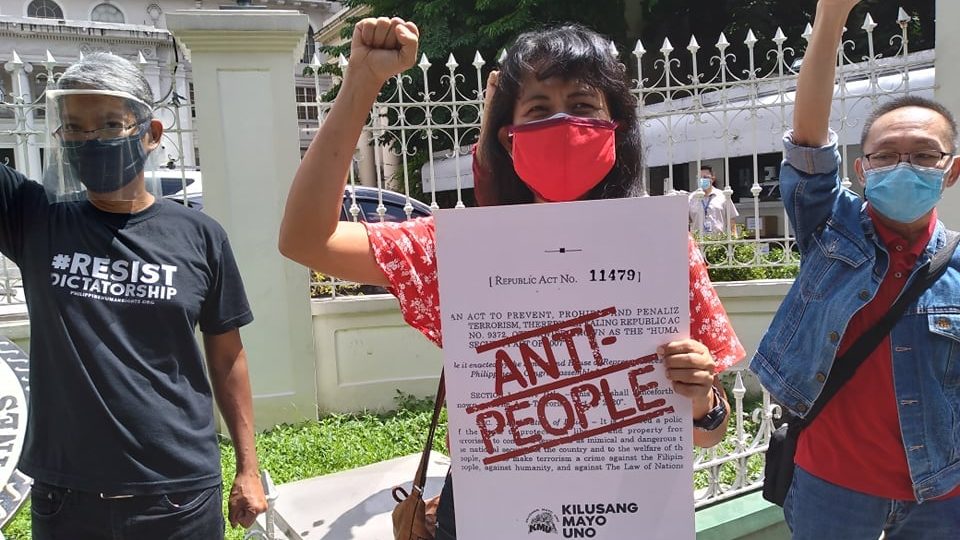Members of various Philippine labor groups today filed the ninth petition against the widely opposed Anti-Terrorism Act of 2020 before the country’s Supreme Court (SC).
The Federation of Free Workers, Nagkaisa Labor Coalition, and Kilusang Mayo Uno asked the SC to issue a temporary restraining order against alleged unconstitutional provisions of the law, which the groups believed “will have a destructive chilling effect” on workers’ right to organize and convey their labor grievances to the government.
These provisions are under Sections 4 to 6, 10 to 12, as well as Section 25 and Section 29 of the law.
Read: Congressman Lagman, lawyers, file petition against anti-terror law before Supreme Court
Like the eight other petitioners before them, the groups questioned the broad and vague definition of terrorism described in the newly signed law. Under Section 25, President Rodrigo Duterte’s government can form an Anti-Terror Council made up of cabinet members who can designate people and groups as terrorists by its own finding and without probable cause. The Council can also freeze the assets of people suspected of terrorism. Section 29, meanwhile, allows the detention of suspected terrorists without a judicial warrant for up to 24 days.
“Under this provision, citizens or ordinary people who merely express their positive opinions or hold a banner, written document, or paraphernalia tending to favor a protest or mass action tagged as a terrorist initiative would be affected and prejudiced by this provision,” the petition read.
“Even giving food, money, or any support to a dependent son or daughter who is tagged or suspected of being a terrorist is fatal as the same is a crime of providing material support to a terrorist,” it added.
The groups said that they were wary of “unrestrained power given to the executive department” by the law which “would be an instrument to terrorize the ordinary citizens who are not terrorists — or be used to aggravate the situation of the workers who are already victims of terrorism or terrorist acts.”
The SC is expected to consolidate the newly filed case with the eight other petitions lodged over the past few weeks.
These include:
- The Calleja group of lawyers
- Albay Representative Edcel Lagman
- Far Eastern University (FEU) Law Dean Mel Sta. Maria and FEU Law professors
- Makabayan bloc
- Rudolf Philip Jurado, the ex-Office of the Government Corporate Counsel Chief
- Center for Trade Union and Human Rights
- Constitution framers and Ateneo lawyers
- Sanlakas Party-list
Malacañang vs U.S. lawmakers on the Terror Law
Yesterday, some 45 United States lawmakers called for the “immediate repeal” of the Anti-Terror Law fearing that it is a “new weapon” which the Duterte government could use to “suppress dissent” and “worsen attacks on ordinary people in the Philippines.”
“I, along with my 44 colleagues sent a letter this morning to the government of the Philippines. We sent it to the ambassador of the Philippines to the United States calling for the immediate repeal of this law,” U.S. Congresswoman Jan Schakowsky said in a virtual presser.
Instead of addressing the issue of the contentious law, Presidential Spokesman Harry Roque defensively responded in a virtual briefing today that the U.S. is no longer the Philippines’ “colonial masters.”
“The Philippines has long been a country independent of America,” Roque said in Filipino.
“Having said that, it’s already in the courts. To the [US] congressmen who signed it, we have a working judicial system and we can rely on our judicial system to rule on the constitutionality of the anti-terror law,” Roque added.
Read: Duterte should ‘refrain’ from signing anti-terrorism bill, says UN human rights chief
The Anti Terror Act of 2020 was signed into law by Duterte early this month, despite calls to junk it by lawyers, rights groups, and ordinary citizens alike, who time and again have said the vague measure could lead to an abuse in power.





Reader Interactions